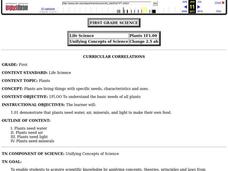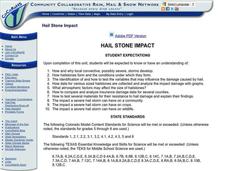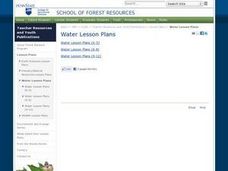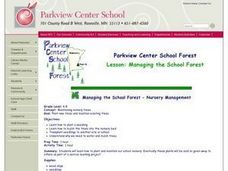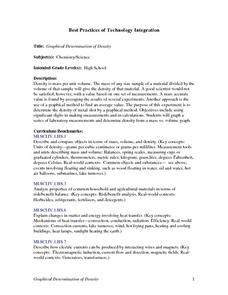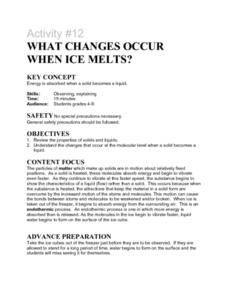Curated OER
Plants
First graders explore the specific needs, characteristics, and uses of plants. They discuss the needs of plants as they grow. Students observe plants in various settings as they grow and note the changes they see.
Curated OER
Weather Review
In this weather worksheet, students reviews terms associated with measuring different weather phenomena plus draw examples of different types of fronts on a weather map. This worksheet has 5 true or false, 15 matching, 21 multiple...
Curated OER
Hail Stone Impact
Sixth graders study the formation of convective storms and test mock hailstones. they graph and analyze collected data.
Curated OER
Physical and Chemical Changes
Eighth graders distinguish between physical and chemical change. In this chemistry lesson, 8th graders observe a series of demonstrations showing physical and chemical changes. They identify the signs that a chemical reaction took place.
Curated OER
"Pennsylvania Watersheds, Many Ways to the Sea"
Students trace a molecule of water through the water cycle including each of its three loops. They describe why evapotranspiration demands the largest portion of total precipitation falling on a forested watershed.
Curated OER
Good Vibrations
Students demonstrate sound waves and make changes in the waves
resulting in changes in pitch. Students associate changes in pitch in various "musical instruments"with size and shape and the sound waves they produce.
Curated OER
Facts of Matter
Young scholars make group decisions about matter as they explore and interpret many types.
Curated OER
MANAGING THE SCHOOL FOREST
Students study how to plant a seedling, how to mulch the trees into the nursery bed, transplant seedlings to another site or school, and determine why we need to water and mulch trees.
Curated OER
Weather Predictions
Fourth graders explore meteorologists. They explore symbols on a weather map and make five day forecasts.
Curated OER
The Rock Cycle
Third graders, in groups, examine soil samples with magnifying glasses. They discuss the living and non-living things they find in their soild samples.
Curated OER
Weather Myths
Fourth graders relate myths to weather phenomenon. They write and illustrated a weather myth and present it to the class.
Curated OER
Weather Records
Young scholars write newspaper articles using a "weather record" worksheet and information they find in newspapers.
Curated OER
Severe Weather Planning
Fourth graders research the need to prepared for a severe weather event. They select one type of weather condition and explain how to be prepared in a report.
Curated OER
Hazard Mitigation: Bioterrorism
High schoolers discuss different ways to spread infectious diseases. In this bioterrorism lesson, students model the rate of smoke emission using CalRoad software. They analyze the effects of airborne release of biological...
Curated OER
Graphical Determination of Density
Learners determine the density of metal shot by a graphical method using significant digits in making measurements and calculations. Students graph a seris of laboratory measurements and determine density from a mass verses volume graph.
Curated OER
Ride the Wild Leaf Cycle
Fourth graders explore plant life by completing an Internet activity. For this botany lesson, 4th graders identify the types of plants that grow locally and the different soils they utilize to survive. Students read assigned text about...
Curated OER
Rockets
Learners explain the basics of rocketry and explain the relationships between mass, acceleration, and thrust.
Curated OER
What Are Our Risks From Radon?
Students discover the risks from radon. They examine a graph of what a low dose of radon will do to a human body and then discuss. They answer questions to complete the lesson plan.
Curated OER
Green Space in the City
High schoolers identify the different kinds and uses of green space that exist in an urban area. They create maps of local parks and research the history of each park. They conduct a survey of residents near the park and interview a park...
Curated OER
Green Space in the City
Students examine city parks and their importance and affect they have on the health and well being of a community. An oral report with visual aids is prepared as a group to educate the class on the importance of green space in the city.
Curated OER
A World Of Matter
First graders complete a variety of experiments with solids, liquids and gases. They read books about matter, identify the characteristics of solids, liquids and gases and the sort and classify a variety of matter. Students make...
Curated OER
Exploring Great Salt Lake
Fourth graders go on a field trip to make observations about plants in the Great Salt Lake area. They make observations about the environment and record the types of pants that are living there. The lesson is to introduce the concepts of...
Curated OER
What Changes Occur When Ice Melts?
Students explore the physical process of melting. They observe melting ice and answer questions related to energy transfer during phase changes.
Curated OER
What Changes Occur When Water Freezes?
Students investigate the changes that occur at the molecular level when a liquid becomes a solid. They freeze water in baby jars and observe the changes that occur in the process.


